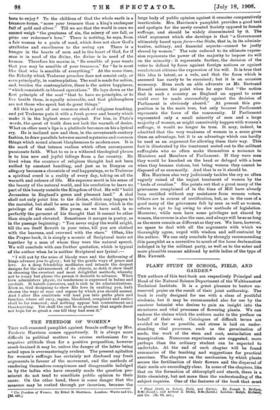THE FREEDOM OF WOMEN.*
This well-reasoned pamphlet against female suffrage by Mrs. Frederic Harrison comes opportunely. It is always more difficult in political matters to arouse enthusiasm for a negative attitude than for a positive proposition, however crack-brained it may be, unless the danger of the latter being acted upon is overmasteringly evident. The present agitation for women's suffrage has certainly not disclosed any fresh arguments in favour of the movement, and the methods of rendering themselves conspicuous and disagreeable indulged in by the ladies who have recently made the question pro- minent do not tend to conciliate ptiblic opinion to their cause. On the other hand, there is some danger that the measure may be rubbed through per ineuriam, because the • The Freedom of Women. By Ethel B. Harrison. London Watts and Co. [ed. alit.] large body of public opinion against it remains comparatively inarticulate. Mrs. Harrison's pamphlet provides a good text and apologia for the newly created Society opposed to female suffrage, and should be widely disseminated by it. The chief argument which she develops is that "a Government ultimately based upon force—the State, that is, in its adminis- trative, military, and financial aspects—cannot be justly shared by women." The vote reduced to its ultimate expres- sion represents the power of the majority to impose its will on the minority : it represents; further, the decision of the voter to defend by force against foreign nations or against recalcitrant citizens the expression of his will. It is true that this idea is latent, as a rule, and that the force which is assumed has rarely to be exercised ; but it is on occasion fiecessary. Even euch an able advocate as Mr. Bertrand Russell misses the point when he says that "the notion that in such a country as England an appeal to arms could ever be made successfully against the decision of Parliament is obviously absurd." At present this pro- position is in the main true, but only because Parliament represents the force of the community. If Parliament represented only a small minority of men and a large majority of women, as might conceivably happen with women's suffrage, it would no longer be true. It may, indeed, be admitted that the very weakness of women in a sense gives them an advantage, but it is an advantage which can hardly be used as an argument for allowing them their way. This fact is illustrated by the treatment meted out to the militant suffragists who so often make themselves a nuisance to Ministers and Members of Parliament. If they were men they would be knocked on the bead or deluged with a hose when they became riotous, but being women they cannot be disposed of so summarily. And that is as it should be.
Mrs. Harrison also very judiciously tackles the cry so often vaguely raised of the unjust treatment of women by the "lords of creation." She points out that a great many of the grievances complained of in the time of Mill have already been rectified without any assistance from women voters. Others are in course of rectification, but, as in the case of a good many of the grievances felt by men as well as women, reform is apt to lag owing to slow methods of legislation. Moreover, while men have some privileges not shared by women, the reverse is also the case, and always will be so as long as the sexes remain as different as they are. We have, however, no space to deal with all the arguments with which we thoroughly agree, urged with wisdom and self-restraint by the author. We can only conclude by strongly recommending this pamphlet as a corrective to much of the loose declamation indulged in by the militant party, as well as to the sober and more plausible reasons adduced by noble ladies of the type of Mrs. Fawcett.






































 Previous page
Previous page